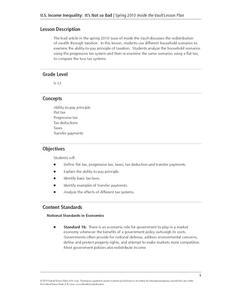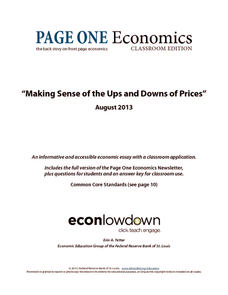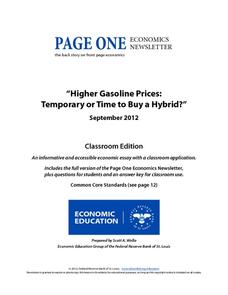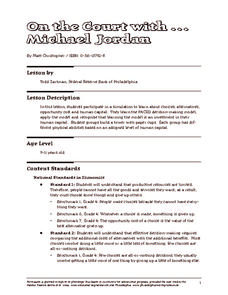Federal Reserve Bank
U.S. Income Inequality: It's Not So Bad
What is the difference between a flat tax, progressive tax, tax deduction and transfer payments? Pupils examine the ability-to-pay principle of taxation through discussion, problem solving, and a variety of worksheets on topics from US...
Federal Reserve Bank
Something Special For Me
People often save money, but what are the benefits and drawbacks of that action? Youngsters learn about saving, savings, and opportunity cost through the lens of a short book, called Something Special for Me.
Federal Reserve Bank
Monster Musical Chairs and Scarcity
Why can't we have everything we want? Youngsters are introduced to the concept of scarcity through a game of musical chairs and by discussing what it takes to satisfy our wants.
Federal Reserve Bank
The Great Inflation: A Historical Overview and Lessons Learned
Your young economists will explore the roots of fears about high inflation by learning the effects of rising prices during the world wars and in particular the Great Inflation of the 1970s.
Federal Reserve Bank
The Car Deal Package
Buying a car is no easy task, and can have major long-term consequences if done without proper financial knowledge. Ensure your learners are prepared with the information and criteria for comparing different car deals and signing contracts.
Federal Reserve Bank
The Little Red Hen Makes a Pizza
Make a study of producers and consumers with an updated version of the classic story The Little Red Hen (this one is called The Little Red Hen Makes a Pizza). After reading and discussing the story and terms, learners practice being...
Federal Reserve Bank
Would Increasing the Minimum Wage Reduce Poverty?
Here is a fantastic and relevant question to discuss with your class members. Using detailed reading material and a related worksheet, your learners will learn about labor markets, equilibrium wages, price floors, and who exactly would...
Curated OER
We're in the Money
Students study money and its place in the economy. In this middle school Consumer Math lesson, students explore the barter system and the need for money. Students explore how money works in society and explore modern money and money in...
Federal Reserve Bank
What Are the ‘Ingredients’ for Economic Growth?
Delve into the concept of economic growth with your class members, including why economic growth is important, what causes it, and how can countries encourage it.
Federal Reserve Bank
The Legacy of the Olympics: Economic Burden or Boon?
Do the economic benefits of major sporting events such as the Olympics or the World Cup outweigh the expected costs? Using fundamental economic terms, discover the explicit and implicit costs and benefits for countries that host these...
Federal Reserve Bank
Making Sense of the Ups and Downs of Prices
What are the consequences and costs of inflation? What is CPI, and how do we calculate it? This resource answers these questions in an organized and in-depth manner, and also includes a activity of follow-up questions designed for an...
Federal Reserve Bank
Higher Gasoline Prices: Temporary or Time to Buy a Hybrid?
Gasoline prices garner a lot of attention in the United States. What can explain a temporary decline in gasoline consumption, and how do gasoline prices spur innovation in the energy and automotive industries?
Federal Reserve Bank
Wait, Is Saving Good or Bad? The Paradox of Thrift
Could saving really harm the economy? Discover the paradox of thrift and how decreases in consumption can affect economic recovery and various markets and industries.
Federal Reserve Bank
Why Scarce Resources Are Sometimes Unemployed
Why do markets operate inefficiently when the world's resources are so limited? Review the various types of unemployment that exist and why some resources, especially human resources, go unused.
Federal Reserve Bank
Investing in Yourself: An Economic Approach to Education Decisions
What is the difference between physical capital and human capital, and in which should you invest? While considering the concept of return on investment, take a look at the payoffs and consequences of investing in training and education.
Federal Reserve Bank
Prices: The Marketplace’s Communication System
Explore the dual role of prices as signals and incentives, and discover how prices are determined by buyers and sellers in the United States economy.
Federal Reserve Bank
The Output Gap: A‘Potentially’ Unreliable Measure of Economic Health?
How can we accurately estimate what the economy should produce now and in the future? Have your pupils tackle this question as they learn about real versus potential GDP and as they review data regarding the output gap in the United States.
Federal Reserve Bank
Choices Are Everywhere: Why Can’t We Just Have It All?
Here is a resource covering a range of terms and concepts regarding scarcity, opportunity cost, and government debt in economics.
Federal Reserve Bank
“Dewey Defeats Truman”: Be Aware of Data Revisions
Discover the impact and importance of data releases about current economic conditions in the United States. Your class members will learn about data revision and the GDP, and how these figures can alter people's views on the economy.
Federal Reserve Bank
On the Court with... Michael Jordan
Pupils learn foundational economic concepts and consider the importance of decision-making, how to evaluate choices and alternatives, and the benefits of consistent training and practice by learning about the early life of Michael Jordan.
Federal Reserve Bank
Saturday Sancocho
What does stew have to do with bartering? Learners will find out how by reading the story Saturday Sancocho, discussing the text, participating in a bartering activity in class (once with goods only and once with money), and discussing...
Federal Reserve Bank
Savvy Savers
What are the benefits and risks of saving in an interest-bearing account? Pupils explore concepts like risk-reward relationship and the rule of 72, as well as practice calculating compound interest, developing important personal finance...
Federal Reserve Bank
To Rent-to-Own or Not to Rent-to-Own?
Explore the key elements of a contract with your young adults, and delve into the features and unique benefits of a rent-to-own contract through discussion and worksheet practice.
Curated OER
Do I Have What it Takes to be an Entrepreneur - and is My Community Ready?
Discover the attributes of entrepreneurs and define what entrepreneurship is while examining data based on local businesses. Learners determine whether their community is supportive of entrepreneurs as they research economic development...

























